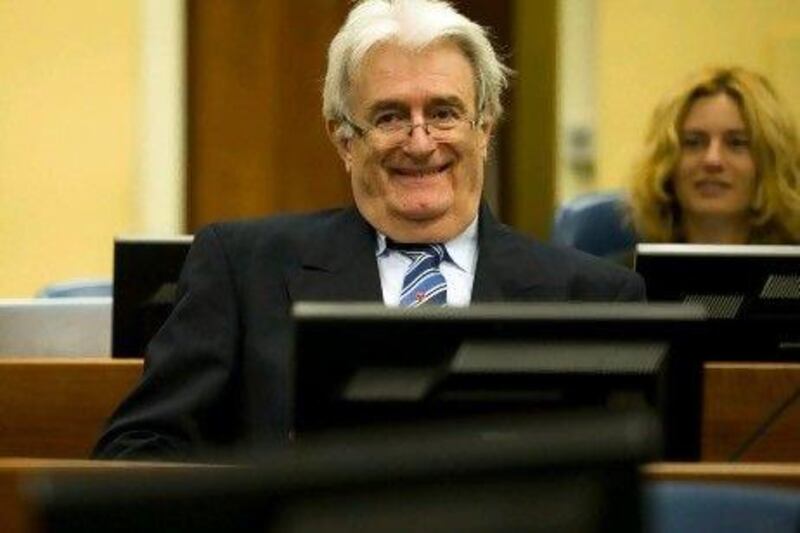THE HAGUE // The former Bosnian Serb leader Radovan Karadzic, accused of the worst atrocities in Europe since the Second World War, said yesterday that he should be praised for promoting peace, not charged with war crimes.
Beginning his defence at his trial in The Hague, Karadzic accused Bosnian Muslims of deliberately staging some of the atrocities against their own people to win international support.
His claim drew gasps of disbelief from Muslim survivors in the gallery of the court.
Karadzic is one of three Serb leaders on trial for war crimes during the violent break-up of multi-ethnic Yugoslavia between 1991 and 1999, in which more than 100,000 people were killed and millions were displaced.
Now 67 and still recognisable by his shock of white hair, he is defending against himself charges of genocide, war crimes and crimes against humanity, and cross-examining witnesses himself.
Looking resigned but relaxed and reading from a pre-written speech, he said Muslims had faked the circumstances of two shellings of a market place in the Bosnian capital Sarajevo during a siege by Serb forces. More than 100 people were killed.
"Sarajevo is my city, and any story that we would shell Sarajevo without any reason is untrue," he said, reiterating long-standing allegations by the Serb side that have already been refuted by The Hague tribunal.
Prosecutors at the International Criminal Tribunal for the former Yugoslavia say Karadzic was jointly responsible for the shelling of Sarajevo when Bosnian Serb forces besieged it from 1992-1996.
He is also charged with being behind the massacre of 8,000 Bosnian Muslims in Srebrenica in 1995.
"Instead of being accused, I should have been rewarded for all the good things I have done," he told the court. "I did everything in human power to avoid the war. I succeeded in reducing the suffering of all civilians."
He added that he was a "mild man, a tolerant man with great capacity to understand others".
Some of the victims expressed disgust at his words.
"It is difficult to even describe how I felt when I heard him saying this," said Kada Hotic in Sarajevo, who lost 56 male family members in Srebrenica.
"I lost so many family members only because they were Muslims in a territory that Karadzic desired to turn into exclusively Serb land. Is that peacemaking?" she asked.
Karadzic said two separate shellings of a Sarajevo market place, in February 1994 and August 1995, in which a 105 people were killed and 234 injured, had been orchestrated.
During the trial of Dragomir Milosevic, chief of staff to the commander of the forces besieging Sarajevo, the court found Bosnian Serb forces were responsible for the 1995 shelling.
As Karadzic opened his defence, the tribunal also began the separate trial of its final suspect, the last chapter for an institution that has broken new ground in the investigation of conflicts and paved the way for a permanent war crimes court.
Goran Hadzic, the last of 161 suspects still alive and at large after the Yugoslav wars, is accused of murder, torture and forcible deportation at the very outset of those wars.
The tribunal has indicted Croats, Muslims, Serbs and Albanians on charges of genocide, war crimes and crimes against humanity in the former Yugoslavia.
The majority were ethnic Serbs, including the former head of state, army chief of staff, defence minister and speaker of the parliament, and many Serbs consider the tribunal to be biased.
A former psychiatrist, Karadzic was arrested in 2008 in Belgrade, where he had been living in disguise.
Bosnian Serb military leader Ratko Mladic went on trial in The Hague this year, after 16 years on the run.
Former Yugoslav and Serbian president Slobodan Milosevic died in 2006 before the end of his trial.






